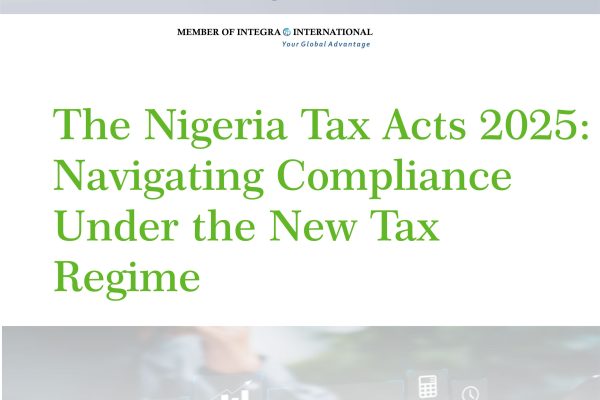Taxation of The Digital Economy in Nigeria
Nigeria is capturing only a fraction of its digital economic potential and will need to make strategic investments to develop a dynamic, transformative digital economy, according to a new World Bank assessment.
The Nigeria Digital Economy Diagnostic says that with improvements in digital connectivity, digital skills, digital financial services and other core areas of digital development, Nigeria can fully unleash new economic opportunities, create jobs and transform people’s lives, as well as generate more revenue for the government through taxes or levies on digital economy.
Taxation is a very important aspect of any economy and its not different in a digital economy. International taxation refers to that aspect of taxation which involves determination of taxes of a business or an enterprise which is operating in different countries and hence subject to tax in different countries
The true ‘digital economy’ is defined as “that part of economic output derived solely or primarily from digital technologies with a business model based on digital goods or services” – consists of the digital sector plus emerging digital and platform services.
Digital economy refers to an economy that is based on digital computing technologies, although we increasingly perceive this as conducting business through market based on the internet and World Wide Web.
The type of business in a digital economy includes:
- Several varieties of e-commerce
- App stores
- Online advertisement
- Online stores.
- E- Trading etc.
“The world’s largest taxi firm, Uber, owns no cars. The world’s most popular media company, Facebook, creates no content. The prominent online stores, such as Jumia, Konga, Jiji has no stock, they are just online platforms where people can easily get stuffs at their door steps, with the increase in active user of such platforms and the digital content creation growing day-by-day, something big is going on.” – Tom Goodwin. Something big is indeed going on and it has been for a while.
For more than 2 decades, Information and Communications Technology (ICT) has been changing the way business is done and the way money is made, even food items are been delivered to people’s door steps. It is hard to think of any serious-minded organization that has never considered the impact of changing business models on its bottom line. So, it is no surprise that tax authorities from many parts of the world eventually got together to work out how these changes were affecting their tax collections; after all tax collection is serious business.
In particular, the spread of the digital economy creates challenges for international taxation as well as domestic tax revenue mobilization. As taxes are the main sources of revenue for the government to fund its various public services and projects, tax authorities must learn to enhance their capabilities to contain the fast change of digital economy activities. However, capacity in governance remains weak in many developing countries such as Nigeria.
As part of that long-term work, this report notes that the Organization for Economic Co-operation and Development (“OECD”) will review the impact of digitization on the economy on two key aspects of the international tax system, namely the nexus for taxation and the methodology for allocating profit to that nexus.
For the short term, the OECD note that no consensus was reached on the need for interim measures, with a number of countries expressing concern that such measures could run counter to international consensus as it develops and may be difficult to undo.
This can further be broken down as follows.
- The nexus rule – determination of where taxes should be paid is based on physical presence
- Profit allocation rule – determination of what portion of profits should be tax is based on arm’s length principle.
These fundamental elements have served their purpose well over the years. They have enshrined tax certainty and helped to eliminate double taxation and stimulate global trade.
Today, economy digitalization has facilitated three important phenomena.
- Large scale trade without physical presence
- Reliance on intangible assets
- Centralization of data
The Organization for Economic Cooperation and Development’s (OECD) is yet to find a lasting solution on how to tackle base erosion and profit shifting (BEPS), rather they came up with two possible options out of the 15 points of Action they came up with.
They opted to leave it open ended, by allowing countries to choose between the two options without affecting the Double Taxation.
The OECD/G20 set up a committee called Inclusive Framework (IF) on BEPS. The IF has the mandate to find a comprehensive, consensus-based solution to the two challenges arising from digitalization and they are committed to deliver this solution before the end of 2020.
In January 2020, the IF developed a two-pillar approach to address the tax challenges arising from digitalization of the economy.
Pillar one – the re-allocation of taxing right. This means creating a new set of tax laws with a brand-new feature (an update).
Three interrelated ideas were considered under this heading.
- To establish new bases for determining when a digital company is liable to tax in a foreign country. Some of the basis considered were revenue, number of active user and extent of digital presence.
- To subject digital businesses to a withholding tax the same way you would apply WHT to dividend and interest earned by a foreign company.
- To apply an equalization levy on digital transaction.
Pillar two – Global anti-base erosion mechanism. This means the existing tax rules should be built upon (Patching). This option was built on the idea that:
- It is better to identify the weaknesses of the current international tax rules and then make specific changes that address these weaknesses rather than create a new one which could have adverse consequences for all countries.
- It also considers that changes being proposed under the remaining 14 action plans could be made robust enough to address the specific BEPS challenges in the digital economy.
Out of the remaining 14 action plans, the following were considered most important for addressing the challenges of the digital economy:
- Action 3 – strengthen controlled foreign company
- Action 7 – preventing the artificial avoidance of permanent establishment status
- Action 8-10 – transfer pricing.
Nevertheless, recognizing that other countries believe it would be necessary to introduce interim measures to shore up their tax bases more quickly, this report lists common principles that those countries believe should be followed to minimize the negative consequences of such measures. Indeed, many countries are already acting unilaterally to address taxation of digital economy businesses.
For example:
- Countries like Israel and India have introduced significant economic presence tests for creating permanent establishments.
- Specific tax regimes for multinational enterprises have been introduced, for example, by the UK and Australia with diverted profit taxes and by the US with its base erosion and anti-abuse tax.
More recently, the European Union’s (“EU”) digital tax strategy proposes both interim measures and a long-term solution. The European Council has stated its preference for a coordinated tax policy response to the challenges raised by the digitalization of the economy at the global level. However, the EC also believes interim measures are needed due to the lack of consensus and the limited progress made at the OECD level in implementing a global standard.
Under the interim measure, the EU’s proposed new 3 percent digital service tax would apply as from January 01, 2020 to revenue from certain services, including selling online, advertising space, creating certain online marketplaces, and transmitting collected user data.
This is far from the consensus in the EU that this is the right approach with many arguing that (1) a global consensus is first needed and (2) “digital” should be treated the same as other businesses.
Some members of the EU have already expressed concerns about the DST (Digital Services Tax).
The digital economy is growing so fast in Nigeria and lots of revenue are been generated by people without paying taxes on them. As the digital market penetration deepens in Nigeria, it is becoming extremely obvious that taxation is the future of the economy. Therefore, the federal government should take advantage of this growing digital economy to boost the GDP of the country and provide a lasting solution on how to tax and track the revenue generated in the digital world. Although the FIRS has put some measure in motions such as the following listed below:
Non-resident companies are now mandated to register with FIRS
The Finance Act 2019 provides that digital services are to be subjected to tax where they have significant economic presence. The determination of significant economic presence lies with the Minister for Finance.
Specific and direct laws should be put in place to address the issues of BEPS and avoid ambiguity and advantage of tax loops holes










